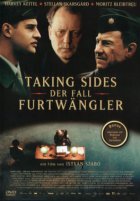
Taking Sides Page #2
- NOT RATED
- Year:
- 2001
- 108 min
- 526 Views
He nods to the projectionist, then starts to go, but stops.
WALLACE:
Oh, one thing that may be a problem.
Our Occupation Authorities in
Wiesbaden have a duty to help these
poor unfortunates with their
defence. They keep repeating: 'We
must be just, we must be seen to
be just.' Well, I've only one thing
to say to the liberals in Wiesbaden:
f*** 'em.
(as he goes)
You answer to no one but me. Is
that understood?
(to the projectionist
in the door)
Show him the film.
PROJECTIONIST:
Yes, sir. Roll it.
Wallace goes. The projectionist starts the next reel.
ON THE SCREEN:
a Berlin sequence. Bombs falling. Ruins, acity devastated, empty. Flags of the four allied nations.
Posters of Truman, Stalin, Churchill.
ARCHIVE FILM VOICE
That is the hand that dropped the
bombs on defenceless Rotterdam,
Brussels, Belgrade. That is the
hand that destroyed the cities,
villages and homes of Russia. That
is the hand that held the whip
over the Polish, Yugoslav, French
and Norwegian slaves. That is the
hand that took their food.
Steve watches expressionless.
WALLACE:
Next reel, please.
ON THE SCREEN:
SHOTS of camp survivors. Then SHOTS ofemaciated corpses being bulldozed into mass graves.
ARCHIVE FILM:
Sanitary conditions were so
appalling that heavy equipment had
to be brought in to speed the work
of cleaning up. This was Bergen
Belsen.
The moment this appears, Steve rises and goes quickly.
ON THE SCREEN:
piles of cadavers.INT. MAJOR STEVE ARNOLD'S BEDROOM (I945) - NIGHT
Steve having a nightmare, twisting, turning, moaning. He
wakes with a cry. He is sweating. He turns on the light,
looks at a clock, reaches for a cigarette, lights it. He
smokes. He stares at the ceiling.
Later:
Early morning. Cold. Steve is at the basin in his small
room, shaving. A radio on a shelf.
AMERICAN RADIO VOICE
Remember, men, no fraternisation.
In a German town, if you bow to a
pretty girl or pat a blond child,
you bow to all that Hitler stood
for. You bow to his reign of blood.
You caress the ideology that meant
death and destruction. You never
know who was a member of the Nazi
Party. Don't be fooled. Don't
fraternise.
EXT. STEVE'S OFFICE BUILDING, BERLIN - DAY
Steve's car swerves round the corner and comes to a halt.
A small crowd watch workmen on ladders hammering away at a
stone swastika above the portico. American soldiers
supervise. Steve gets out of the car, carrying an attache
case, and he, too, watches as the stone swastika falls and
crashes into pieces on the road. One or two people clap,
most just stare.
The American soldiers immediately hoist the Stars and
Stripes. Steve goes into the building. The sentry salutes.
The driver of the car goes to the trunk and takes out a
labelled duffel bag, cans of film, a case which holds a 16-
mm projector. A small BOY sidles up to him:
BOY:
Cigarettes, chewing gum?
INT. WAITING ROOM - DAY
Steve and Sergeant Adams ascending a grand, winding but
damaged staircase to the rear of a spacious entrance hall.
A once impressive building. Signs of bomb damage everywhere.
German workmen doing repairs. American military personnel
coming and going, saluting Steve, who barely acknowledges
them.
They reach the landing. Adams opens double doors and they
go through.
ADAMS:
We're gonna have the heating fixed
by tonight.
A few gilt chairs, a workman trying to repair the stove.
Adams opens another door for Steve.
INT. STEVE S OFFICE - DAY
EMMI is hanging the standard photograph of President Truman
on the wall. She turns to see Steve and Adams and is covered
with confusion. She gives Steve a little curtsey.
ADAMS:
Fräulein, this is Major Arnold.
Sir, this is your secretary,
Fräulein Emmi Straube. Her file's
on your desk. They sent her over
from Admin. I'll leave you to it.
He goes. Steve scrutinises Emmi. She's embarrassed, keeps
her eyes downcast. Steve goes to his desk, opens a file,
reads.
STEVE:
You live here, in Berlin?
EMMI:
Yes.
STEVE:
You do shorthand and typing?
EMMI:
Yes.
He nods, goes on reading.
STEVE:
Okay, let's see. How long were you
in the camp for?
EMMI:
Three months.
Translation
Translate and read this script in other languages:
Select another language:
- - Select -
- 简体中文 (Chinese - Simplified)
- 繁體中文 (Chinese - Traditional)
- Español (Spanish)
- Esperanto (Esperanto)
- 日本語 (Japanese)
- Português (Portuguese)
- Deutsch (German)
- العربية (Arabic)
- Français (French)
- Русский (Russian)
- ಕನ್ನಡ (Kannada)
- 한국어 (Korean)
- עברית (Hebrew)
- Gaeilge (Irish)
- Українська (Ukrainian)
- اردو (Urdu)
- Magyar (Hungarian)
- मानक हिन्दी (Hindi)
- Indonesia (Indonesian)
- Italiano (Italian)
- தமிழ் (Tamil)
- Türkçe (Turkish)
- తెలుగు (Telugu)
- ภาษาไทย (Thai)
- Tiếng Việt (Vietnamese)
- Čeština (Czech)
- Polski (Polish)
- Bahasa Indonesia (Indonesian)
- Românește (Romanian)
- Nederlands (Dutch)
- Ελληνικά (Greek)
- Latinum (Latin)
- Svenska (Swedish)
- Dansk (Danish)
- Suomi (Finnish)
- فارسی (Persian)
- ייִדיש (Yiddish)
- հայերեն (Armenian)
- Norsk (Norwegian)
- English (English)
Citation
Use the citation below to add this screenplay to your bibliography:
Style:MLAChicagoAPA
"Taking Sides" Scripts.com. STANDS4 LLC, 2025. Web. 22 Jan. 2025. <https://www.scripts.com/script/taking_sides_403>.






Discuss this script with the community:
Report Comment
We're doing our best to make sure our content is useful, accurate and safe.
If by any chance you spot an inappropriate comment while navigating through our website please use this form to let us know, and we'll take care of it shortly.
Attachment
You need to be logged in to favorite.
Log In